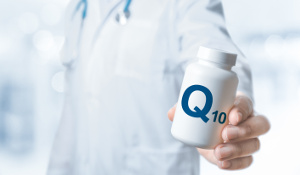Q10 lowers the side effects of cholesterol-lowering drugs
 Cholesterol-lowering statins are associated with side effects such as aching muscles, fatigue, memory problems, diabetes, and poor sleep. At a molecular level, these drugs interfere with the body’s synthesis of Q10, which we need for cellular energy turnover. Moreover, Q10 is a powerful antioxidant that protects the cells against free radical damage. According to a review article published in the journal Cureus, Q10 supplements may lower side effects such as muscle pain.
Cholesterol-lowering statins are associated with side effects such as aching muscles, fatigue, memory problems, diabetes, and poor sleep. At a molecular level, these drugs interfere with the body’s synthesis of Q10, which we need for cellular energy turnover. Moreover, Q10 is a powerful antioxidant that protects the cells against free radical damage. According to a review article published in the journal Cureus, Q10 supplements may lower side effects such as muscle pain.
Cholesterol is an essential compound that is needed for cell membrane integrity and for synthesizing vitamin D, Q10, and steroid hormones like cortisol, testosterone, and estrogen.
We get cholesterol from food sources of animal origin, but most of the cholesterol in our body is synthesized in the liver. Cholesterol is transported by carrier proteins (lipoproteins). LDL (low-density lipoprotein) carries cholesterol to the cells, and HDL (high-density lipoprotein) returns cholesterol to the liver. It is important to have the right balance between the two different lipoproteins, and it is only natural for the body’s total cholesterol (the sum of both types) to increase with age. Elevated cholesterol levels represent a controversial topic, and the threshold values have been lowered. For that reason, statins are among the most widely used cholesterol-lowering drugs, simply because it is common belief that elevated cholesterol can lead to atherosclerosis, cardiovascular disease, blood clots, and stroke.
Statins work by blocking HMG CoA, which is a coenzyme involved in the synthesis of a cholesterol precursor called mevalonate. Statins are able to lower cholesterol levels by 30-50 percent. They also regulate the functions of endothelial cells and inflammatory processes that are important for the cardiovascular system. As statins block all the other functions and compounds that depend on cholesterol, these drugs cause a host of different side effects like:
- Muscle pain or muscle weakness
- Rhabdomyolysis – breakdown of muscle tissue and release of myoglobin that can damage the kidneys
- Liver damage
- Diabetes
- Impotence
- Tiredness and poor memory
- Sleep disruptions
Muscle disease (myopathy) is one of the most common side effects of statin use and affects around 30 percent of patients. One of the reasons why the problem occurs is that statins block the endogenous Q10 synthesis. Q10 is a vital part of the cellular energy turnover, and because muscles require a lot of energy during physical activity, they are sensitive to a Q10 shortage. Q10 is also a powerful antioxidant that protects cells and the circulatory system against damage caused by free radicals and oxidative stress.
Lack of Q10 results in impaired energy turnover in the muscles and in other tissues. It also increases the vulnerability to cellular damage. This combination of things is what causes muscle related side effects.
Not surprisingly, one in five statin users discontinue their statin use after a period of 12 months or so.
The purpose of the new study was to investigate how Q10 supplementation affects people suffering from statin-induced side effects like myopathies.
Q10 reduces myopathy
Searching through different databases, including Medline, PMC, PubMed, Science Direct, and Google Scholar, the researchers gathered data from studies of adult statin users who had been given Q10 supplements in connection with their myalgia. The eligible studies, counting one meta-analysis and four controlled studies, had all been published between 2010 and 2023 and included 800 patients. They had taken on average 100-200 milligrams of Q10 or placebo for 3-6 months. According to the study results, Q10 supplementation was able to ameliorate statin-induced myopathy and counteract oxidative stress and dysfunctions of the cells’ energy-producing mitochondria. Also, Q10 can raise levels of HDL and improve the body’s utilization of vitamin C and vitamin E, both of which are important for the antioxidant defense of muscle cells.
The body has difficulty with absorbing Q10. Therefore, it is important to choose a product with documented absorption and bioavailability to ensure that the Q10 molecules reach the blood and get carried to the muscle cells and other cells where Q10 is needed.
What turns cholesterol into a cardiovascular threat?
There is a lot of discussion about cholesterol levels and how they affect us. LDL only becomes a risk if it oxidizes. Oxidation destroys the cholesterol, rendering it useless for its numerous functions. Instead of being used purposefully, it becomes embedded in the blood vessel walls. So, it is oxidized cholesterol that sets the stage for atherosclerosis. It is not the elevated cholesterol level that is the problem.
Sources:
Khoula Ahmad et al. Effectiveness of Coenzyme Q10 Supplementation in Statin-Induced Myopathy: A Systematic Review. 2024
Jan Aaset, Jan Alexander, Urban Alehagen. Coenzyme Q10 supplementation – In ageing and disease. Mechanisms of Ageing and Development. 2021
Lain Hargreaves et al. Disorders of Human Coenzyme Q10 Metabolism: An Overview. International Journal of Molecular Sciences. 2020
TIP! See also the related articles
Search for more information...
- Created on .








